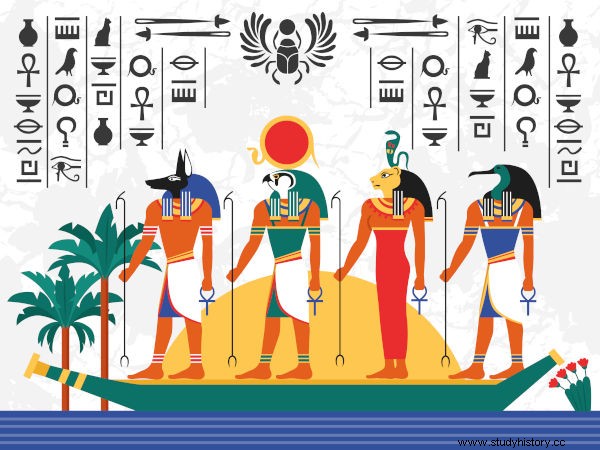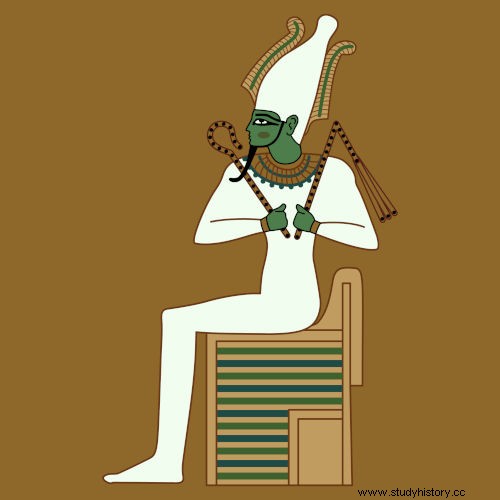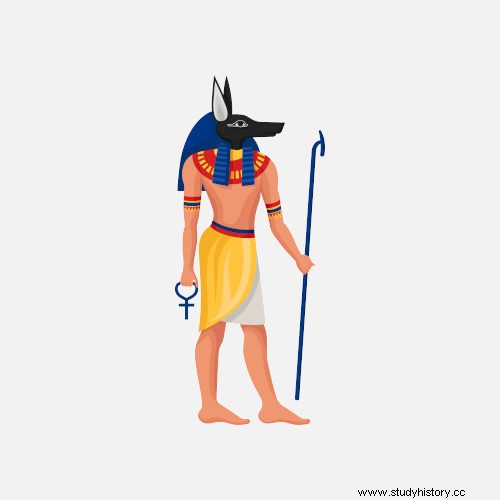
The Gods of Egypt were the deities that were part of the Egyptian religion. There was a wide variety of gods in this religion, and so we understand the Egyptians to be polytheists. Belief in the gods was an important feature of Egyptian religion, and local populations believed that they acted to ensure the well-being of human beings.
Go to also :History of the Pharaohs of Egypt
Summary on Gods of Egypt
-
The Egyptians were polytheists, that is, they believed in more than one god.
-
There were gods that could be worshiped in just one city but also those that were very popular and worshiped throughout Egypt.
-
Heka and ma'at were two important concepts in religion and in the relationship of the Egyptian people with their gods.
-
The Egyptians performed rituals and festivals in worship of their gods.
-
Among the best-known gods were Ra, Amon, Isis, and Osiris.
Ancient Egyptian religion
Belief in the gods of Egypt was a part of the religion practiced by the Egyptians in A seniority. The religion of the Egyptians, as was common at the time, was polytheistic , for they worshiped several gods. The variety of gods was great, with some deities worshiped only in one city, while others, however, could be very popular and worshiped throughout the Egyptian territory.
Worship of the gods was a very important feature of Egyptian religiosity, and it was common for people to say their prayers in shrines. Prayers could be for various reasons, such as requests for health maintenance, fertility, prosperity or for some clarification. The performance of rituals and festivals in honor of the gods was common among the Egyptians.
However, this relationship of the Egyptians with their gods and their worship of them involved two very important concepts — ma'at and heka . The first concept mentioned an idea of harmony , that is, the Egyptians always acted in life with a view to preserving the harmony of the Universe.
This is an important concept because the Egyptians believed that one person's actions could negatively affect other people and even upset the harmony of the Universe, causing chaos. Thus, they sought to follow the will of the gods because they believed that the divine will was good and guaranteed harmony.
Communication with the gods was only possible, according to Egyptian belief, because of heka , understood as a power fundamental that existed in the Universe. This force was responsible for the powers and for the very emergence of the gods, and through it contact between the gods and the faithful was established.
-
Ancient Egypt video lesson:religion
Understanding the Gods of Egypt
The Egyptians believed that their gods controlled the Universe as well as people's destiny. Egyptian belief held that the gods cooperated to ensure the well-being of the people and, as mentioned, the harmony of the Universe.
The Egyptians believed that their land was blessed by their gods and that all their riches had been provided by them. They attributed all the knowledge they possessed to the gods and claimed that this civilizational knowledge had been passed on to them by Osiris, god who had been a pharaoh of Egypt in local belief.
The Egyptians believed that their gods were among them and that animals could be your manifestation . Therefore, many animals, when they died, received honors worthy of the nobility. In their relationship with the gods, the Egyptians believed that the display of ingratitude was harmful because ingratitude was not something that pleased the gods and, therefore, could affect the harmony of the Universe.
The belief of the Egyptians in their gods permeated many aspects of their lives, and one of the points in this regard was the life after death . The Egyptians were very concerned about the continuity of their life after earthly death and sought to please the gods in order to guarantee their existence in the afterlife.
The Egyptians believed thatmummification was another practice taught to them by the gods, as well as they believed they would have their actions in life judged by the gods in the Court from Osiris . This court decided whether people's souls would go on to eternal life or be destroyed by a monster. However, only righteous people would have the right to eternal life.

How did the gods of Egypt come about?
Egyptian religion, like any other, has its origin myths, that is, myths that narrate the emergence of things, such as the gods and the Universe. One of these myths spoke of the emergence of the Egyptian gods, which began when the Universe was a void dominated by chaos.
Through heka , the fundamental power, a hill arose, and that hill was inhabited by a god named Tuna , Pta or Ra (There are variations between versions of the myth). From Atum came Shu and Tephnis, god of air and goddess of moisture respectively. Both abandoned their father and went to live on Earth.
On Earth they established the principles of life, and their absence saddened their father, Tuna. When they returned, Tuna wept with happiness, and her tears gave birth to human beings . Subsequently, Shu and Tephnis became lovers and had two children, named Geb and Nut.
Geb and Nut also became lovers, and this relationship was not approved by Atum, who decided to imprison Geb in the earth and Nut in the sky. Nut was pregnant, and from her pregnancy five children were born:Osiris , Isis , Set , Nephthys and Horus (Other versions present Horus as the son of Osiris and Isis).
Login also :Inca religion — considered their deities to be beings of nature
What were the main gods of Egypt?

As mentioned, the Egyptian religion was made up of several gods , some more important than others. Some of them were worshiped in only one city, but they were important anyway. Here is a list of the main gods that formed the Egyptian pantheon:
-
Ha
-
Amon
-
Anubis
-
Osiris
-
Isis
-
Horus
-
Set
-
Nephthys
-
Shu
-
Hator
-
Tot
-
Maat
-
Tephnis
-
Geb
-
Bastet
-
Mut
-
Sekhmet
-
Pta
